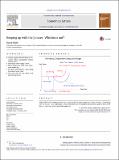Files in this item
Keeping up with the Joneses : who loses out?
Item metadata
| dc.contributor.author | Ulph, David Tregear | |
| dc.date.accessioned | 2014-11-14T12:01:01Z | |
| dc.date.available | 2014-11-14T12:01:01Z | |
| dc.date.issued | 2014-12 | |
| dc.identifier | 94086868 | |
| dc.identifier | 581943f0-78e4-4b95-9c18-a588275c27d3 | |
| dc.identifier | 000347604000018 | |
| dc.identifier | 84909992408 | |
| dc.identifier.citation | Ulph , D T 2014 , ' Keeping up with the Joneses : who loses out? ' , Economics Letters , vol. 125 , no. 3 , pp. 400-403 . https://doi.org/10.1016/j.econlet.2014.10.029 | en |
| dc.identifier.issn | 0165-1765 | |
| dc.identifier.other | ORCID: /0000-0003-3171-1270/work/59464536 | |
| dc.identifier.uri | https://hdl.handle.net/10023/5771 | |
| dc.description.abstract | This paper investigates how well-being varies with individual wage rates when individuals care about relative consumption and so there are Veblen effects – Keeping up with the Joneses – leading individuals to over-work. In the case where individuals compare themselves with their peers – those with the same wage-rate - it is shown that Keeping up with the Joneses leads some individuals to work who otherwise would have chosen not to. Moreover for these individuals well-being is a decreasing function of the wage rate - contrary to standard theory. So those who are worst-off in society are no longer those on the lowest wage. | |
| dc.format.extent | 10 | |
| dc.format.extent | 386325 | |
| dc.language.iso | eng | |
| dc.relation.ispartof | Economics Letters | en |
| dc.subject | Veblen Effects; | en |
| dc.subject | Consumer choice | en |
| dc.subject | Nash equilibrium | en |
| dc.subject | wages and well-being | en |
| dc.subject | HB Economic Theory | en |
| dc.subject | Economics, Econometrics and Finance(all) | en |
| dc.subject.lcc | HB | en |
| dc.title | Keeping up with the Joneses : who loses out? | en |
| dc.type | Journal article | en |
| dc.contributor.institution | University of St Andrews. School of Economics and Finance | en |
| dc.identifier.doi | https://doi.org/10.1016/j.econlet.2014.10.029 | |
| dc.description.status | Peer reviewed | en |
This item appears in the following Collection(s)
Items in the St Andrews Research Repository are protected by copyright, with all rights reserved, unless otherwise indicated.

